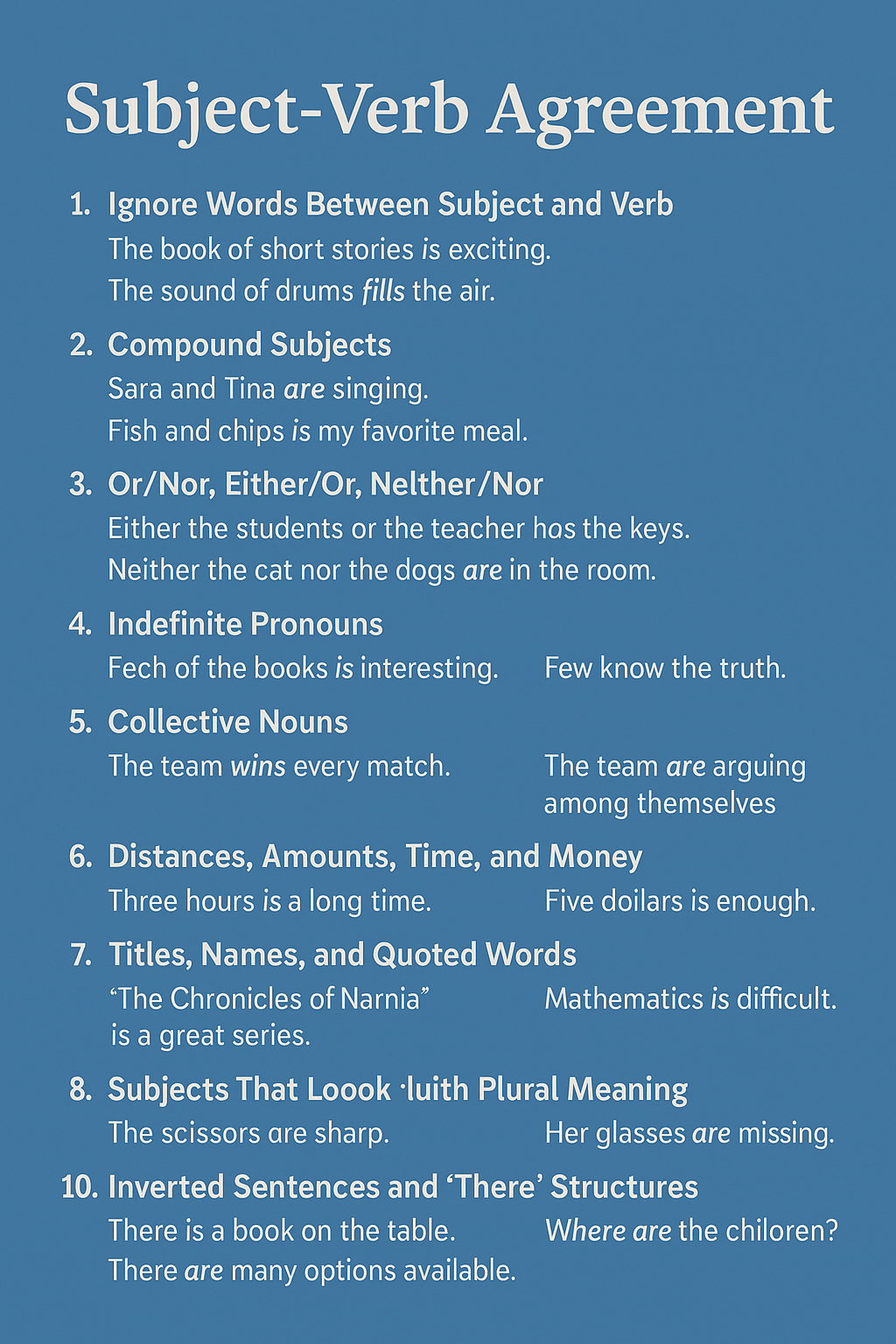Subject-Verb Agreement – GPS-45
Subject-Verb Agreement – Grammar Puzzle Solved-(45)
What Is Subject-Verb Agreement?
Subject-verb agreement means the subject and verb in a sentence must match in number. A singular subject takes a singular verb. A plural subject takes a plural verb. This rule forms the foundation of English grammar.
- Correct: She walks to school.
- Correct: They walk to school.
Even though the rule is simple, many sentences become confusing when modifiers, phrases, or special nouns appear. That’s why a deep understanding of subject-verb agreement is important for clear writing.
Why Subject-Verb Agreement Matters
A mismatch between subject and verb can ruin sentence clarity. Readers may misunderstand your point. In professional, academic, or test settings, this error leads to penalties. Mastering subject-verb agreement improves writing precision, grammar confidence, and overall fluency.
Core Rule of Subject-Verb Agreement
Singular subjects need singular verbs.
Plural subjects need plural verbs.
- She runs every day. (singular)
- They run every day. (plural)
Detailed Rules and Examples
1. Ignore Words Between Subject and Verb
The subject is not always right next to the verb. Ignore prepositional phrases or other modifiers that come in between.
- The book of short stories is exciting.
- The sound of drums fills the air.
Focus on the main subject: book, sound—not the words inside the phrase.
2. Compound Subjects
a. Subjects Joined by “And”
When two subjects are joined by and, the verb is plural.
- Sara and Tina are singing.
- My brother and I go to the same school.
b. Single Idea Using “And”
If the compound subject forms one unit or idea, use a singular verb.
- Fish and chips is my favorite meal.
- Macaroni and cheese was served.
3. Subjects Joined by “Or,” “Nor,” “Either/Or,” “Neither/Nor”
When the subjects are connected by or or nor, the verb agrees with the closer subject.
- Either the students or the teacher has the keys.
- Neither the cat nor the dogs are in the room.
This rule is called proximity agreement.
4. Indefinite Pronouns
Some indefinite pronouns are always singular, some always plural, and some can be both depending on context.
a. Always Singular:
- anyone, someone, nobody, everybody, each, either, neither
Each of the books is interesting.
Nobody knows the answer.
b. Always Plural:
- both, few, many, several
Many were invited.
Few know the truth.
c. Singular or Plural Depending on Meaning:
- all, some, none, any, most
Some of the cake is gone. (uncountable)
Some of the apples are rotten. (countable)
5. Collective Nouns
Collective nouns name a group but are usually singular in American English.
- The team wins every match.
- The jury delivers a verdict.
However, if members are acting individually, use a plural verb.
- The team are arguing among themselves.
- The family have gone their separate ways.
British English prefers plural agreement for collective nouns.
6. Distances, Amounts, Time, and Money
These are treated as singular, even though they may look plural.
- Five dollars is enough.
- Three hours is a long time.
- Ten kilometers is too far to walk.
These expressions refer to a single quantity or unit, not individual items.
7. Titles, Names, and Quoted Words
These always take a singular verb, no matter how plural they may sound.
- “The Chronicles of Narnia” is a great series.
- Mathematics is difficult.
- News is always changing.
Subjects that end in “s” but refer to a singular topic take singular verbs.
8. Subjects That Look Plural but Are Singular
Some nouns look plural but are treated as singular.
- Mathematics, economics, politics, physics
Politics is often controversial.
Economics requires analysis.
9. Plural Form Subjects with Plural Meaning
Some nouns are always plural and require plural verbs.
- Scissors, trousers, glasses, pliers
The scissors are sharp.
Her glasses are missing.
Use “a pair of…” to make them singular:
A pair of scissors is on the table.
10. Inverted Sentences and “There” Structures
Find the real subject, not the word “there” or the verb position.
- There is a book on the table.
- There are many options available.
- Where are the children?
Always locate the subject after the verb in such structures.
Common Errors to Avoid
- Mistaking prepositional phrases for the subject
- Forgetting proximity rule in “either/or”
- Misjudging collective noun usage
- Not spotting indefinite pronouns
- Confusing uncountable nouns with plural ones
Tips to Master Subject-Verb Agreement
- Always identify the true subject of the sentence.
- Don’t be fooled by phrases or modifiers.
- Memorize the behavior of special nouns.
- Practice using tricky subjects in your own writing.
- Read your sentences aloud—errors often become clear by sound.
Practice Sentences
- The basket of apples ___ (is/are) full.
- Either the teacher or the students ___ (has/have) made a mistake.
- Few ___ (was/were) interested in the lecture.
- Mathematics ___ (is/are) my favorite subject.
- The committee ___ (has/have) reached a decision.
Answers: is, have, were, is, has
Conclusion
Subject-verb agreement governs every sentence you write. Without it, your writing seems unclear or incorrect. This complete guide gives you all the rules, cases, and exceptions you need. Whether you’re a student, teacher, or language lover, mastering subject-verb agreement strengthens your writing like no other rule.
Practice daily. Write with clarity. Let your subjects and verbs agree every time.

The Neoclassical Period in English Literature:
https://englishlitnotes.com/2025/06/28/neoclassical-period-in-english-literature/
Dangling Modifiers in Grammar:
https://grammarpuzzlesolved.englishlitnotes.com/dangling-modifiers-in-grammar/
Postmodern American Literature: https://americanlit.englishlitnotes.com/postmodern-american-literature/
First Year at Harrow by Sir Winston Churchill:
https://englishwithnaeemullahbutt.com/2025/06/02/first-year-at-harrow/
For grammar lessons, visit ChatGPT to explore the platform and interact with the AI: https://chat.openai.com
Discover more from Grammar Puzzle Solved by Naeem Ullah Butt
Subscribe to get the latest posts sent to your email.
